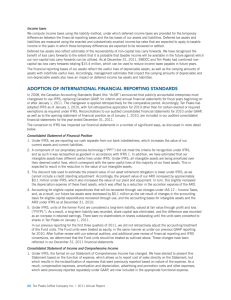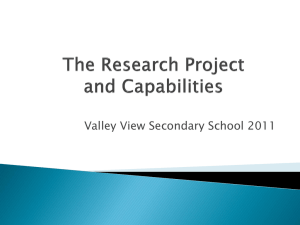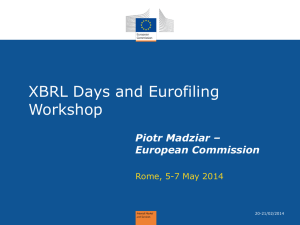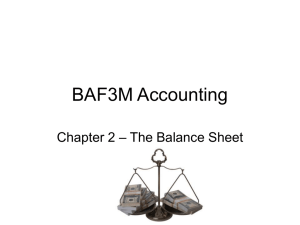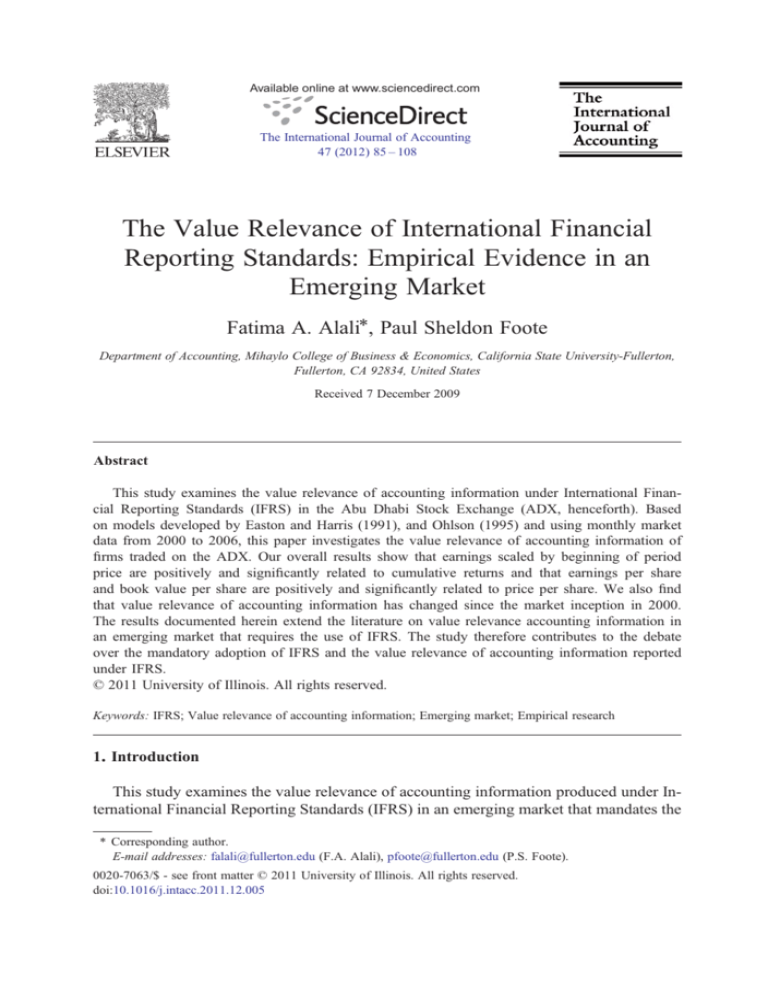
Available online at www.sciencedirect.com
The International Journal of Accounting
47 (2012) 85 – 108
The Value Relevance of International Financial
Reporting Standards: Empirical Evidence in an
Emerging Market
Fatima A. Alali⁎, Paul Sheldon Foote
Department of Accounting, Mihaylo College of Business & Economics, California State University-Fullerton,
Fullerton, CA 92834, United States
Received 7 December 2009
Abstract
This study examines the value relevance of accounting information under International Financial Reporting Standards (IFRS) in the Abu Dhabi Stock Exchange (ADX, henceforth). Based
on models developed by Easton and Harris (1991), and Ohlson (1995) and using monthly market
data from 2000 to 2006, this paper investigates the value relevance of accounting information of
firms traded on the ADX. Our overall results show that earnings scaled by beginning of period
price are positively and significantly related to cumulative returns and that earnings per share
and book value per share are positively and significantly related to price per share. We also find
that value relevance of accounting information has changed since the market inception in 2000.
The results documented herein extend the literature on value relevance accounting information in
an emerging market that requires the use of IFRS. The study therefore contributes to the debate
over the mandatory adoption of IFRS and the value relevance of accounting information reported
under IFRS.
© 2011 University of Illinois. All rights reserved.
Keywords: IFRS; Value relevance of accounting information; Emerging market; Empirical research
1. Introduction
This study examines the value relevance of accounting information produced under International Financial Reporting Standards (IFRS) in an emerging market that mandates the
⁎ Corresponding author.
E-mail addresses: falali@fullerton.edu (F.A. Alali), pfoote@fullerton.edu (P.S. Foote).
0020-7063/$ - see front matter © 2011 University of Illinois. All rights reserved.
doi:10.1016/j.intacc.2011.12.005
86
F.A. Alali, P.S. Foote / The International Journal of Accounting 47 (2012) 85–108
use of IFRS by its listed firms. 1 There has been considerable debate over the value relevance of accounting information prepared under IFRS. The goal of establishing IFRS is
to develop an internationally acceptable set of high quality financial reporting standards.
The International Accounting Standards Committee (IASC) and its successor, the International Accounting Standards Board (IASB), have issued principle-based standards (Barth,
Landsman, & Lang, 2008). Barth, Beaver, and Landsman (2001) show that firms with high
quality accounting have a stronger association between stock prices and earnings and book
value because higher earnings quality better reflects a firm's economic condition. Barth et
al. (2008) indicate that accounting standards that reduce opportunistic behavior result in accounting earnings that have high value relevance as documented by Ewert and Wagenhofer
(2005). However, IFRS may also lead to lower quality and thus, less value relevance of accounting information if the standards fail to report on firm's economic position and performance (Barth et al., 2008; Soderstrom & Sun, 2007).
Existing studies show conflicting evidence on the value relevance of accounting information provided under International Accounting Standards (IAS)/IFRS versus domestic
Generally Accepted Accounting Principles (GAAP). Studies show earnings and book
value are more value relevant under IFRS than domestic GAAP (e.g. Barth et al., 2008;
Bartov, Goldberg, & Kim, 2005; Liu & Liu, 2007), while other studies find contrary evidence (e.g. Hung & Subramanyam, 2007). Moreover, Barth et al. (2008), Daske, Hail,
Leuz, and Verdi (2008), Soderstrom and Sun (2007), and Ali and Hwang (2000) report
interdependence between accounting standards and the country specific factors and individual firm's incentives that possibly result in different economic consequences of financial reporting standards.
Therefore, this study examines empirically the value relevance of accounting information under IFRS in an emerging market in one country, the United Arab Emirates
(UAE). Examining the value relevance of accounting information under IFRS in an emerging market is interesting because investors in emerging markets have very limited information available. Thus we expect that publicly available accounting information is value
relevant (Liu & Liu, 2007). Firms traded on the Abu Dhabi Stock Exchange (ADX) are
subject to the United Arab Emirates Securities and Commodities Authority (ESCA 2) regulations as well as to the ADX laws. Prior studies show some evidence of the IFRS enforcement level in the UAE market (Al-Shammari, Brown, & Tarca, 2008). In addition,
there is conflicting evidence about market efficiency in the UAE market (e.g. Ebid,
1990; Moustafa, 2001, 2004; Squalli, 2006) that potentially affects the value relevance
of accounting information in this market (Abdel-Khalik, Wong, & Wu, 1999).
The ADX laws and regulations require all domestic firms listed to file their financial
statements under IFRS. The ADX also requires listed firms to have audited financial statements including auditor's reports stating whether the firm's financial statements are in
compliance with IFRS. Al-Shammari et al. (2008) indicate that the average level of
1
Because the data is unavailable for the firms before the market inception (i.e. pre-mandatory IFRS adoption
period), we are unable to compare the value relevance of accounting information under IFRS with a preadoption period.
2
ESCA is the UAE-equivalent to the U.S. Securities Exchange Commission and is a member of the International Organization of Securities Commissions (IOSCO).

